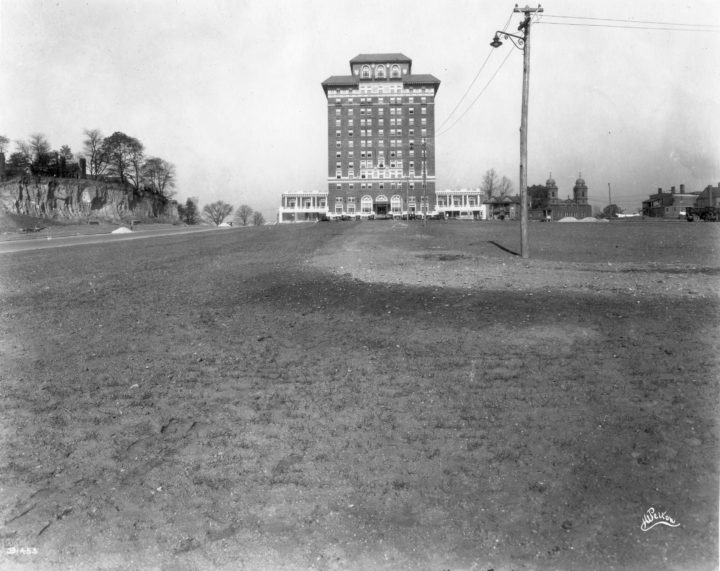In last week’s Asheville Archives, we looked at the community’s 1922 reaction to E.W. Grove’s plans to demolish the original Battery Park Hotel, along with the hill it stood atop. This week’s article picks up where we left off. The year is 1923, and residents are preparing for the historic site’s impending destruction as it enters its final nine months of operation.
On Jan. 21, 1923, resident Hubert Holloway offered a detailed account of the hostelry’s former guests and history in The Sunday Citizen. Holloway noted that when Col. Frank Coxe opened the original Battery Park on July 12, 1886, it quickly became “a haven of rest” for many notable public figures, including presidents Grover Cleveland and William McKinley. Another prominent guest, George Washington Vanderbilt, “stood on the veranda of the Battery Park Hotel and gazed across the valleys to Pisgah and in his heart was born the desire to own and beautify a vast part of this region,” Holloway declared.
By summer, the newspaper notified readers that some of Battery Park’s furniture and kitchen equipment were available for sale. Soon thereafter, on Aug. 26, a full page advertisement featured a rendering of the new Battery Park Hotel and its surrounding property. The 200-room hostelry, scheduled to open in the fall of 1924, would feature a spacious lounge, a large dining room and a rooftop garden.
On Sept. 6, with less than two weeks to go before the original Battery Park officially closed, Holloway returned to the paper with a follow-up article, stating:
“Progress and sentiment does not go hand in hand, railroads must cross treasured spots, streets must pass through private lawns, treasured buildings must fall to give way to more modern structures; but all Asheville will regret to see the Battery Park Hotel razed.”
Demolition began shortly after the hotel’s Sept. 15 closure. By November, a fire consumed some of the remaining structure. According to the Nov. 18 edition of The Sunday Citizen, an exposed wire in an elevator shaft created the flames that destroyed an estimated $30,000 in materials.
The paper went on to note that hundreds of people gathered atop neighboring rooftops “to catch a glimpse of the burning structure.” Initial curiosity and awe turned into trepidation and panic, as “showers of sparks started several small roof blazes on Asheland Avenue.” The damage, however, was minor; flames were swiftly extinguished.

In the same day’s publication, a separate account framed the inferno as a heroic and fitting end for the historic hotel. The article asserted that there was “a haughty majesty of defiance in the ancient structure as it clasped to its bosom the red tongued and amber hued flames that were to be its saviour from the hands of the prosaic wrecking crews.”
The unnamed writer later observed that the structure’s surviving chimneys appeared to “look down on man” the following day “with a cynical, sardonic smile.”
The article concluded with a fictional monologue attributed to the ruins of the hotel. It read:
“For 30 years, and more you have been predicting I would meet my end in this manner. For more than a score of years you have boasted to our companion that flames would envelop me, but that was not my desire, I had no wish to go until my usefulness was at an end and now that I have run my race, I am satisfied. You tried to destroy me, but I wanted to meet my end, in my own way, to go out as I had lived, in a blaze of glory.”
The new Battery Park Hotel opened on Sept. 18, 1924. At its opening, Grove spoke, declaring the property evidence of his “ever increasing faith in the growth and future of Asheville.”
The hotel continued hosting guests until October 1972. It now operates as the Battery Park Senior Apartments.
Editor’s note: Peculiarities of spelling and punctuation are preserved from the original documents.



Before you comment
The comments section is here to provide a platform for civil dialogue on the issues we face together as a local community. Xpress is committed to offering this platform for all voices, but when the tone of the discussion gets nasty or strays off topic, we believe many people choose not to participate. Xpress editors are determined to moderate comments to ensure a constructive interchange is maintained. All comments judged not to be in keeping with the spirit of civil discourse will be removed and repeat violators will be banned. See here for our terms of service. Thank you for being part of this effort to promote respectful discussion.